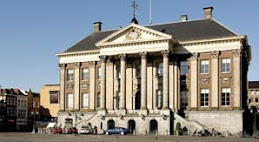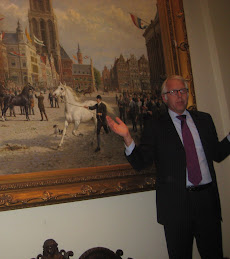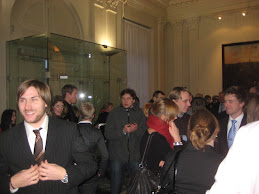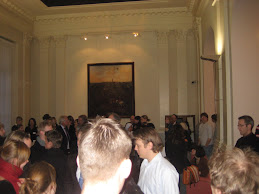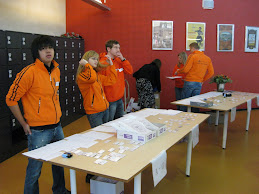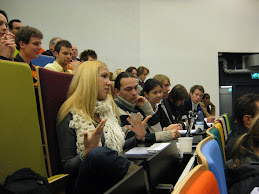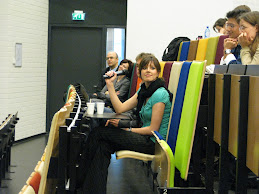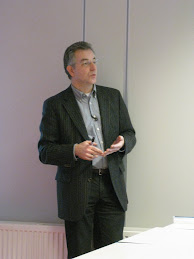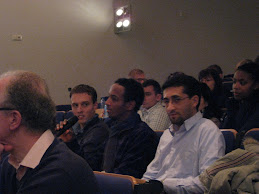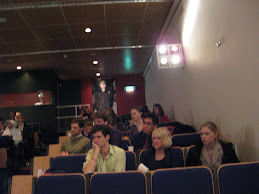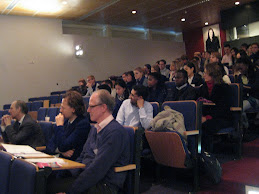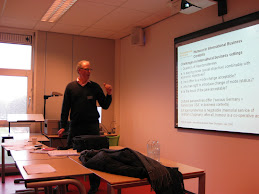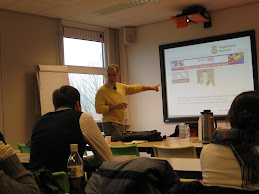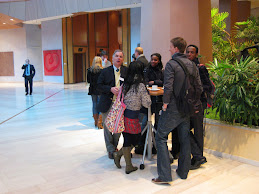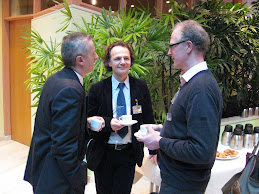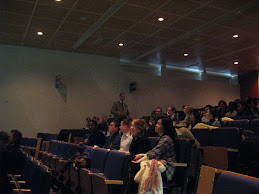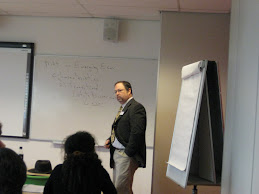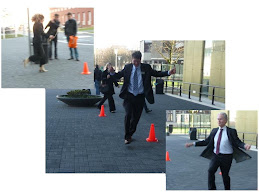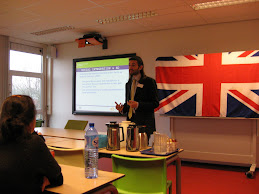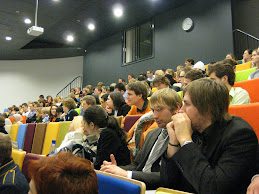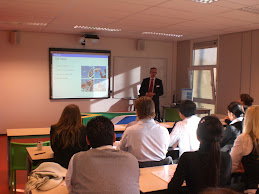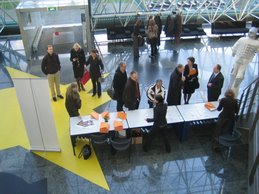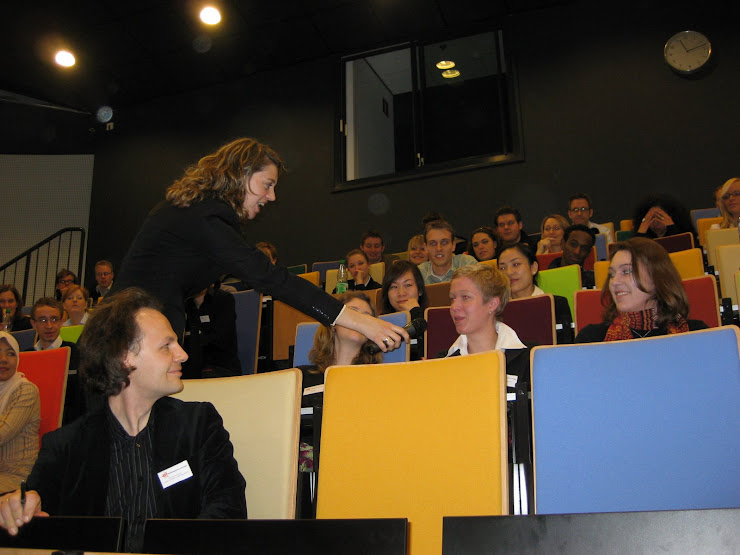WEDNESDAY, January 28th, 2009
Message from Kerstin Schulte
The first lecture on the third day of the International Business Week was given by Jürgen Rigterink from the FMO, a Development Finance Company. The topic was „The effects of the Financial Crisis on Emerging Markets: from a Development Bank’s Perspective”. After Mr Rigtering introduced the FMO with a video and explained it’s function, he went into details about the past and current financial situation in emerging markets and some further consequences. Afterwards, he talked about the consequences for countries and gave an insight in what the crisis means for Africa, which is surprisingly not as immune as many people think it is. What the FMO does and where the bank invests became more clear after Mr Rigtering gave two examples: One of a wood and paper producing company in Argentina and another of an universal bank in Georgia. Finally, the lecture was rounded off with a Q&A session.
The second lecture was given by Michaele Carriere who all of you probably know and it was about the “Relativity – Domains of Ethics and Culture in International Business”.
Probably most of you have filled out a questionnaire about ethical and cultural competences during this year’s introduction phase. Michaele Carriere was responsible for this research as she investigated how effective the IBS is in teaching these competencies, by observing 1st, 2nd and 3rd year students. Mrs Carrier is still busy with this research and she presented some intermediary results. The fact that these findings raised many questions and ended up in discussions showed that this research was worth it and there is still a need for further investigation.
This afternoon started with a lecture on the global financial credit crisis given by Wouter van der Stok. After Mr Stok had already given an introduction about the current situation and the causes of the crises on Tuesday, this was already the second part of the threepart lecture. Therefore, he continued today with an analysis of the situation and talked about possible solutions for the crisis and a realistic time frame. Finally, he gave a brief comparison between the present situation and the 1929/39 depression. On Thursday the third part of this lecture will take place and I am already looking forward to what he will deal with.
This day rounded off with a lecture and a guided tour through the Gasunie in Groningen, a European gas infrastructure company. After some initial coffee in the reception hall we followed an interesting lecture given by Hans Coenen; the CFO of the Gasunie Germany. He talked about the transforming energy chain and gave an overview of past achievements, present changes and a future outlook of the Gasunie. The network of the company ranks among the largest high pressure gas pipeline grids in Europe, consisting of over 15,000 kilometres of pipeline. The fact that the European gas production decreases while the demand in Europe increases shows how dependent we are from supply sources. That is also the fact why gas can always be associated with power and politics. To make this clearer, Mr Coenen addressed the issue of the recent gas crises and the dispute between Russia and the Ukraine. Furthermore, the importance of an adequate infrastructure was pointed out, where Gasunie becomes involved. After the lecture which was rounded off with a Q&A session, we were divided into three groups of 25 people each and we were guided through the building. I was impressed by the consistent organic architecture – the whole building was full of plants and there was no rectangularity which underlined the natural aspects of the architectural style. The Gasunie-headquarter was built in 1993 and was designed by the architects Alberts & van Huut. It was chosen to be the most beautiful building of the Netherlands by the Dutch newspaper readers which I can definitely understand. I can hardly imagine that people actually work there and the trip was definitely worth a visit.
-------------------------------------------------------------------------------------------------
Message from Kathy Ruiz
Bram ten Kate opened the day by introducing the first guest- Jurgen Rigterink who is the Chief Investment Officer (CIO) of FMO, a Dutch financial company engaged in investing in emerging markets. The topic of the presentation was “The effect of the financial crisis on emerging markets.”
The presentation started with a movie which was about the FMO’s core business-investing in emerging markets. In the movie, the CEO of the company pointed out the basic attributes of the emerging markets, the countries where the company operates in, and how FMO differs from the commercial banks.
After the movie, Jurgen Rigterink took over and continued elaborating on the structure of FMO, types of emerging markets, and the short and long-term effects of the financial crisis on those markets. It was clear that the presenter was truly knowledgeable and he could draw attention. In addition, his message was sent across and triggered an interesting discussion and questions even amongst teachers.
It is important to point out that, despite the seriousness of the subject, Mr. Rigterink had sense of humor which appealed to the audience. Talking about the financial crisis and the ‘black swan’ events, he started the core of his presentation with the following question: ‘What is the difference between the Zimbabwean economy and Wall Street’ and the answer was: ‘There is some hope for Zimbabwe’.
Giving appropriate examples and telling more about his experience, of which he mentioned his work life in Kazakhstan and a recent meeting with the CEO’s of African banks in Washington, increased the spotlight on him even further.
The interactive nature of the presentation grew even more when Mr. Rigterink introduced two cases from FMO’s practice. They were about a paper-producing company in Argentina and a universal bank of Georgia. The follow-up discussion raised various questions to which the CIO gave complete and clever answers.
In a nutshell, the presentation was very professional, well conducted, informative, and provided real-life examples.
Thursday, January 29, 2009
Wednesday, January 28, 2009
FIRST INTERNATIONAL BUSINESS WEEK on January 26th - 29th, 2009
TUESDAY, January 27th, 2009
Message from Kathy Ruiz
Heather White was one of our key speakers this morning. I was very anxious to see her presentation about forced labor and labor conditions in many of today’s big-branded suppliers. She addressed issues of child labor, forced labor, and health and safety violations in the supply chain of big Western companies, such as Nike. You won’t believe the number of forced labor in countries such as China, Thailand, and Malaysia. I’ve just been there, and I can’t imagine anyone living in such conditions. I’m very glad that there are organizations like hers who are trying to help.
This topic was extremely interesting, since she pointed out the many factors which contribute to these main issues. Key players are the suppliers themselves, big companies who try to reduce production costs, consumers who purchase such products, the government, etc. However, it seems that none of these are big contributors to the solution. Instead, it’s bigger organizations, like the UN’s ILO and UNICEF, and companies like Verite and New Standards, who try to get things right.
Ms. White’s simple remarks made a great impression on me. When she showed us the conditions on which some people live, all I could think of was: at what cost can someone live like that? I imagined Tiger Wood’s $22 million dollar contract with Nike, and just asked myself: How can he wear a shirt that supports the lifestyle and condition of its creators, and do nothing about it? It’s like telling his fans “I have millions, that’s all that matters”. I was thinking: what if, instead of taking the money, he tells Nike he’ll represent them for a year as long as they invest that money in improving the working conditions for those people. Then, whenever he wears his shirt, he would be supporting livable working conditions. I’m sure Nike representatives would agree and smile, those thousands of workers would smile, and he would smile in return.
But coming back to reality, why should he be the one doing something about it? Isn’t the company supposed to take care of this and not partner up with businesses with poor labor conditions? Yet again, isn’t the government responsible for making sure decent labor conditions are enforced? This is obviously not working, so then maybe the regular sporting consumer is to blame for wanting to keep low prices and still purchasing such goods? Trying to find who is to blame is an endless, vicious circle, and it feels like the right solution, is no solution at all.
A better question is: Who can change this? For sure, everyone can. Heather is evidence that a change can be made; she is an inspiration and a great example for today’s society. After all “Impossible is nothing,” right? All you have to do, is just do it.
-------------------------------------------------------------------------------------------------
Message from Kerstin Schulte
Internationalization of entrepreneurial small and medium size firms
Nowadays, we will possibly switch companies around eight times during our career ladder, so the chances that we will be working for a small or medium sized company (SME) at some point of our career is high. That is why I decided to attend the lecture “Internationalization of entrepreneurial small and medium size firms” by Andreas Zaby, a professor at the FHW Berlin.
Mr Zaby started his lecture by giving some relevant data background. As many SMEs focus on niche market products, the possibility of export increases. Often products are targeted at a small amount of customers, which are spread around the world. Therefore, 60% of the total revenue of SMEs in Germany comes from exporting activities.
Although China is climbing up the ladder, Germany is still on top of the list of being export leader. Around 60% of these exports are generated by large companies (little in number), the rest is generated by SMEs or small companies (whereas this are the most in number).
Interesting to see is that German mid sized niche product world market leaders are often located within clusters. An example would be the automotive sector which clusters around Stuttgart with Porsche, Mercedes and suppliers of components such as Bosch, while the publishing and banking sector clusters around Frankfurt am Main. Of course, this phenomenon of agglomeration is visible all over the world. Although companies compete globally, there is strong evidence that the location continues to play a crucial role in the competitive advantage a company has (due to the fact that input, such as raw material, capital or knowledge is available which lowers the costs). This role of the location in the competitive advantage is also known as “Globalization Paradox”. Whereas traditionally, a company that internationalizes follows different stages; the more recent approach for a company is to “leapfrog” the different traditional stages and go global right after foundation.
After giving this theoretical input, Mr Zaby presented some examples of born-global game developer firms. These are mainly clustered in Berlin due to the fact that there are leading institutes located for people specialising in game development (Game academies). Therefore, Berlin has a great potential of programming talents that are able to combine the technology with creativity and design elements.
Mr Zaby’s forecasts predict that in future more and more SMEs will go global as the barriers that create reluctance are becoming easier to overcome. Furthermore, the amount of SMEs in general is expected to increase as many large companies shrink in size due to outsourcing activities.
All in all, this lecture gave an interesting insight in current developments of small and medium sized enterprises and I was not aware of the tremendous growth, these companies are currently experiencing.
-------------------------------------------------------------------------------------------------
Message by Joost van Slobbe
The second day of the IBS international business week, again was full of interesting workshops and presentations. I did not expect very much from this day, mainly because the speakers/representatives from the different companies weren’t that well know, I must say however that this day was more interesting than the first day.
Heather White, from New Standards, kicked of the day. She gave a very interesting and confronting presentation on the subject social and environmental challenges in a rapidly globalizing world. Her presentation, mainly was focussed on the labour conditions for people working in countries such as China, India etc. and off course on the companies responsible for this, like Nike. Next to that there was a focus on the environmental consequences of irresponsible management decisions. As an example she gave the disaster in Bhopal in 1984 when 42 tons of toxic gas leaked.
After that Mr. Diederich Bakker from the International Business School at the Hanze University gave a presentation on vertical brand portfolio management. Mr. Bakker is one of the key-marketing lecturers at IBS, he gave a very lively and interactive presentation focussed on the differences between national brands and private labels.
During the 50-minute break there was the possibility for students to talk to some recruiters to have an informal talk and to discuss future career opportunities.
The afternoon session was divided into two parts of 1.5 hours each. We had the possibility to choose between five different workshops/presentations each time.
During the first session, some universities like the London South Bank University, the Catholic University of Lublin John Paul II and the Fachhochschule Berlin provided interesting presentations covering sustainable development in business, internationalization and the use of proverbs. Representatives, from the Holland Trading Group and ECOS Sustainable improvement, where also present to give interesting workshops.
During the second session three of the same speakers presented their ideas to a different group of students, but two where replaced byothers. Mr. Wouter van der Stok from IBS began his trilogy on the Global Financial Crisis, which he will continue Wednesday and Thursday. Furthermore, Agita Donina, from the School of Business Administration Turiba told about the MBA program Travel & Tourism given at their University.
Tomorrow, again a very interesting day is scheduled with many different speakers and a nice trip to the Gasunie!
Message from Kathy Ruiz
Heather White was one of our key speakers this morning. I was very anxious to see her presentation about forced labor and labor conditions in many of today’s big-branded suppliers. She addressed issues of child labor, forced labor, and health and safety violations in the supply chain of big Western companies, such as Nike. You won’t believe the number of forced labor in countries such as China, Thailand, and Malaysia. I’ve just been there, and I can’t imagine anyone living in such conditions. I’m very glad that there are organizations like hers who are trying to help.
This topic was extremely interesting, since she pointed out the many factors which contribute to these main issues. Key players are the suppliers themselves, big companies who try to reduce production costs, consumers who purchase such products, the government, etc. However, it seems that none of these are big contributors to the solution. Instead, it’s bigger organizations, like the UN’s ILO and UNICEF, and companies like Verite and New Standards, who try to get things right.
Ms. White’s simple remarks made a great impression on me. When she showed us the conditions on which some people live, all I could think of was: at what cost can someone live like that? I imagined Tiger Wood’s $22 million dollar contract with Nike, and just asked myself: How can he wear a shirt that supports the lifestyle and condition of its creators, and do nothing about it? It’s like telling his fans “I have millions, that’s all that matters”. I was thinking: what if, instead of taking the money, he tells Nike he’ll represent them for a year as long as they invest that money in improving the working conditions for those people. Then, whenever he wears his shirt, he would be supporting livable working conditions. I’m sure Nike representatives would agree and smile, those thousands of workers would smile, and he would smile in return.
But coming back to reality, why should he be the one doing something about it? Isn’t the company supposed to take care of this and not partner up with businesses with poor labor conditions? Yet again, isn’t the government responsible for making sure decent labor conditions are enforced? This is obviously not working, so then maybe the regular sporting consumer is to blame for wanting to keep low prices and still purchasing such goods? Trying to find who is to blame is an endless, vicious circle, and it feels like the right solution, is no solution at all.
A better question is: Who can change this? For sure, everyone can. Heather is evidence that a change can be made; she is an inspiration and a great example for today’s society. After all “Impossible is nothing,” right? All you have to do, is just do it.
-------------------------------------------------------------------------------------------------
Message from Kerstin Schulte
Internationalization of entrepreneurial small and medium size firms
Nowadays, we will possibly switch companies around eight times during our career ladder, so the chances that we will be working for a small or medium sized company (SME) at some point of our career is high. That is why I decided to attend the lecture “Internationalization of entrepreneurial small and medium size firms” by Andreas Zaby, a professor at the FHW Berlin.
Mr Zaby started his lecture by giving some relevant data background. As many SMEs focus on niche market products, the possibility of export increases. Often products are targeted at a small amount of customers, which are spread around the world. Therefore, 60% of the total revenue of SMEs in Germany comes from exporting activities.
Although China is climbing up the ladder, Germany is still on top of the list of being export leader. Around 60% of these exports are generated by large companies (little in number), the rest is generated by SMEs or small companies (whereas this are the most in number).
Interesting to see is that German mid sized niche product world market leaders are often located within clusters. An example would be the automotive sector which clusters around Stuttgart with Porsche, Mercedes and suppliers of components such as Bosch, while the publishing and banking sector clusters around Frankfurt am Main. Of course, this phenomenon of agglomeration is visible all over the world. Although companies compete globally, there is strong evidence that the location continues to play a crucial role in the competitive advantage a company has (due to the fact that input, such as raw material, capital or knowledge is available which lowers the costs). This role of the location in the competitive advantage is also known as “Globalization Paradox”. Whereas traditionally, a company that internationalizes follows different stages; the more recent approach for a company is to “leapfrog” the different traditional stages and go global right after foundation.
After giving this theoretical input, Mr Zaby presented some examples of born-global game developer firms. These are mainly clustered in Berlin due to the fact that there are leading institutes located for people specialising in game development (Game academies). Therefore, Berlin has a great potential of programming talents that are able to combine the technology with creativity and design elements.
Mr Zaby’s forecasts predict that in future more and more SMEs will go global as the barriers that create reluctance are becoming easier to overcome. Furthermore, the amount of SMEs in general is expected to increase as many large companies shrink in size due to outsourcing activities.
All in all, this lecture gave an interesting insight in current developments of small and medium sized enterprises and I was not aware of the tremendous growth, these companies are currently experiencing.
-------------------------------------------------------------------------------------------------
Message by Joost van Slobbe
The second day of the IBS international business week, again was full of interesting workshops and presentations. I did not expect very much from this day, mainly because the speakers/representatives from the different companies weren’t that well know, I must say however that this day was more interesting than the first day.
Heather White, from New Standards, kicked of the day. She gave a very interesting and confronting presentation on the subject social and environmental challenges in a rapidly globalizing world. Her presentation, mainly was focussed on the labour conditions for people working in countries such as China, India etc. and off course on the companies responsible for this, like Nike. Next to that there was a focus on the environmental consequences of irresponsible management decisions. As an example she gave the disaster in Bhopal in 1984 when 42 tons of toxic gas leaked.
After that Mr. Diederich Bakker from the International Business School at the Hanze University gave a presentation on vertical brand portfolio management. Mr. Bakker is one of the key-marketing lecturers at IBS, he gave a very lively and interactive presentation focussed on the differences between national brands and private labels.
During the 50-minute break there was the possibility for students to talk to some recruiters to have an informal talk and to discuss future career opportunities.
The afternoon session was divided into two parts of 1.5 hours each. We had the possibility to choose between five different workshops/presentations each time.
During the first session, some universities like the London South Bank University, the Catholic University of Lublin John Paul II and the Fachhochschule Berlin provided interesting presentations covering sustainable development in business, internationalization and the use of proverbs. Representatives, from the Holland Trading Group and ECOS Sustainable improvement, where also present to give interesting workshops.
During the second session three of the same speakers presented their ideas to a different group of students, but two where replaced byothers. Mr. Wouter van der Stok from IBS began his trilogy on the Global Financial Crisis, which he will continue Wednesday and Thursday. Furthermore, Agita Donina, from the School of Business Administration Turiba told about the MBA program Travel & Tourism given at their University.
Tomorrow, again a very interesting day is scheduled with many different speakers and a nice trip to the Gasunie!
Tuesday, January 27, 2009
FIRST INTERNATIONAL BUSINESS WEEK on January 26th - 29th, 2009
MONDAY, January 26th, 2009
Message from Kathy Ruiz:
Hi! My name is Kathy Ruiz, I come from Mexico and I'm currently in the 4th year of both my studies of International Communication and International Business.
Just when you thought you’re finally done with exams and off to a holiday, IBS came up with another new module worth one more credit. This week, the International Business Week will be taking place at IBS, with speakers from different countries addressing different issues in today's business world.
Today, the International Business Week kicked off with a good start. I was surprised to find that the lectures are starting at 10:00am (yay!) instead of 8:30am, which is most likely the case. At 9:30am, I went to check-in at the new Willem Alexander Sportscentrum; it was the first time I was in the sportscentrum.
The event was opened by Paul Ganzeboom, the Dean of IBS, who highlighted the importance of this week's lectures and the outstanding position of the IBS program at Hanze. Afterwards, some lectures were carried out by Cor de Ruiter (board of directors), Jan Kets (lecturer of IBS) and representatives from World Essence. I particularly enjoyed the presentation of intercultural differences by Ad Fernhout, World Essence founder, and Margaret v.d. Wetering, an IBS alumna currently working at World Essence. They were very enthusiastic and gave extraordinary examples of cultural difference situations by reenacting personal experiences of culture shock. They filled the room with interest and laughter, and established a great connection with the students, since many have gone through intercultural challenges while being abroad. At some point, they asked the audience about their own experience with the "equality" dimension of Dutch culture. I gave an example of my own personal experience during my internship and they impersonated this situation quite well, where Ad reenacted my character. Everyone found this quite funny, including me.
During the lunch break, we headed towards the atrium, and on the way there was a “War Child” campaign outside the tower. For 1 euro, you could participate in a “jump rope race” for the cause. Ad, Desiree(World Essence), Margaret, and Bram ten Kate (IBS Team Manager) went for the challenge, and all got a chocolate for their efforts. It must’ve been tough for the girls to jump rope on high heels—respect!
In the afternoon sessions, I had a lecture on the cultural aspects of doing business in China, with Linda van den Broek from the Kentfort Company. She gave nice descriptions and examples of Hoftede's cultural dimensions in both China and The Netherlands. It was nothing really new to me, since I've just finished a China specialization at International Communication, but I believe this is a very interesting topic for first-time listeners. I highly recommend it to those who have already experienced a big culture shock, since it will help them understand the 'why' aspect of cultures.
The second afternoon session I attended was given by Jacques Hémon, where he explained the concept of international law and its role in business. It was very interesting to see the complexity for international companies to deal with other international organizations.
Take note: when doing business with the U.S. choose the California law system, where basically everything is possible (‘The Governator’ should know) ;).
It was a good day, though now it’s time for some ‘lekker’ Mexican dinner. Let’s see what tomorrow brings… ¡Hasta mañana!
-----------------------------------------------------------------------------------------------
Message from Kerstin Schulte:
An international career in Philips
The first lecture I attended during the International Business Week was “An international career in Philips”. The lecturer Frank Snellens studied economies and labour law and is now working as a Human Resource Director in the Consumer Lifestyle Department of Philips in Drachten.
Philips Royal Electronics was founded in 1891 and is one of the largest global electronics companies. It’s main drivers to growth is a solid R&D fund which helps in designing advanced and easy to use products. Probably most of us get regular in touch with one of these products – let it be a shaver, a Senseo or an MP3-player. The company is active in three different sectors: Healthcare (mainly B2B-business), Lighting, and Consumer Lifestyle (shavers, domestic appliances etc).
Philips is constantly looking to increase it’s talent pool by focussing on diversity. The employees experience this diversity not only on a cultural level, but also by the possibility to change sectors and collect a broad range of experiences within different market sectors. The company puts a focus on the so-called 2-2-2 experience which means, that high potential employees should have the opportunity to work in at least two different geographic regions, in two different market sectors and be able to work cross-functional, thus collect experiences in different departments.
Philips calls itself a people-centric company. In order to guarantee high potential employees the company makes use of a so-called “Leadership Competency Framework” that helps measuring all employees of the organisation. This means that every employee is measured under the following points: He should be able to create innovative strategies, inspire commitment, leverage capabilities, champion people’s growth, drive for results and pursue market insights. The latter point shows the companies customer focus: constantly customers are observed and interviewed to discover their needs and all products are created according to these needs.
In order to find talents, Philips offers so-called “European Business courses”, which are entry assessments for high profile employees. After applying via the company website, interested graduates will be selected and interviewed via telephone. Then, 30-35 graduates are allowed to enter the European Business Courses which take place in different departmental sectors (Marketing, Finance etc.). The ones that pass the assessment tests, will attend an intensive three-day course, where they are constantly observed in order to be finally rated by different managers. All participants who score over an 8.0 during this course are being insured to get a job at Philips. When a graduate gets a job, Philips insures every employee the opportunity to climb the career letter by a special procedure introduced by the company called “Talent Identification”. During this procedure employees are asked to rate their colleagues. Afterwards, the outcome is shared with the respective employee and a personal development plan is prepared together with a supervisor.
All in all this was an interesting lecture about the Management Career Options at Philips and everyone who is inspired now, should have a look at www.philips.com and check the Career Sector for further information.
-------------------------------------------------------------------------------------------------
Message from Joost van Slobbe:
Hi all,
My name is Joost van Slobbe, during the first IBS international business week, I will describe some workshops/presentations, which have been given. Today I will talk about the workshop given by Mr. Snellens from Philips. First I will introduce Mr. Snellens, followed by a description of his presentation.
Mr. Snellens studied economics and law at the HogeschoolEnschede from which he graduated in 1989. After that he had a series of jobs as a HR manager at companies such as Vroom en Dreesman, FMO and KPMG. Later he worked as an interim manager for Yacht and ended up at his current employer Philips in October 2003. Within Philips he has worked at many different departments but currently is responsible for the Philips site in Drachten, where they havethe T&D groups Shavers, Grooming, Small Household Appliances and Advanced Technology,production site for Shavers and a Logistic centre.
The presentation, which was given by Mr. Snellens, focussed on an International Career at Philips. Philips was founded in 1891 in Eindhoven, The Netherlands, but currently has its headquarters in Amsterdam. The company hadsales in 2007 of around €26,793 million with some 134,200 employees worldwide.
The way Philips does business is centred around the customer, they want to make live easier by looking at what customers want and making sure that their products can be used without having to read the manual first. That is why they changed their old slogan “Let’s make things better” in 2004 to “Sense and Simplicity”.
A good example of a product which fits this description, is the Senseo coffee machine, which is very easy to use but has a very sophisticated interior.
Philip has designed a special program in order to improve their management, but also to get new talent, or high/top potentials, to work at Philips. This is focussed on the following points:
· Grow people in becoming good leaders.
· Improve diversity (try to attract more women for management functions).
· Attract new (international) talent.
· Simplicity
· Make the step from good to great.
Mr. Snellens also showed how Philips handles its selection of new talent, what the steps are to start a career at Philips and what is expected from the employee, but also what he or she can expect to get in return. A special 3-day program is designed by Philips to make sure they get new talent in house, this is called the Business course. During these three days, an opportunity is given to show that you have what it takes to become a future leader at Philips.
The 1.5 hours during presentation gave a very clear and interesting insight on the career possibilities at Philips and showed that they are one of the top Global players in their field.
Message from Kathy Ruiz:
Hi! My name is Kathy Ruiz, I come from Mexico and I'm currently in the 4th year of both my studies of International Communication and International Business.
Just when you thought you’re finally done with exams and off to a holiday, IBS came up with another new module worth one more credit. This week, the International Business Week will be taking place at IBS, with speakers from different countries addressing different issues in today's business world.
Today, the International Business Week kicked off with a good start. I was surprised to find that the lectures are starting at 10:00am (yay!) instead of 8:30am, which is most likely the case. At 9:30am, I went to check-in at the new Willem Alexander Sportscentrum; it was the first time I was in the sportscentrum.
The event was opened by Paul Ganzeboom, the Dean of IBS, who highlighted the importance of this week's lectures and the outstanding position of the IBS program at Hanze. Afterwards, some lectures were carried out by Cor de Ruiter (board of directors), Jan Kets (lecturer of IBS) and representatives from World Essence. I particularly enjoyed the presentation of intercultural differences by Ad Fernhout, World Essence founder, and Margaret v.d. Wetering, an IBS alumna currently working at World Essence. They were very enthusiastic and gave extraordinary examples of cultural difference situations by reenacting personal experiences of culture shock. They filled the room with interest and laughter, and established a great connection with the students, since many have gone through intercultural challenges while being abroad. At some point, they asked the audience about their own experience with the "equality" dimension of Dutch culture. I gave an example of my own personal experience during my internship and they impersonated this situation quite well, where Ad reenacted my character. Everyone found this quite funny, including me.
During the lunch break, we headed towards the atrium, and on the way there was a “War Child” campaign outside the tower. For 1 euro, you could participate in a “jump rope race” for the cause. Ad, Desiree(World Essence), Margaret, and Bram ten Kate (IBS Team Manager) went for the challenge, and all got a chocolate for their efforts. It must’ve been tough for the girls to jump rope on high heels—respect!
In the afternoon sessions, I had a lecture on the cultural aspects of doing business in China, with Linda van den Broek from the Kentfort Company. She gave nice descriptions and examples of Hoftede's cultural dimensions in both China and The Netherlands. It was nothing really new to me, since I've just finished a China specialization at International Communication, but I believe this is a very interesting topic for first-time listeners. I highly recommend it to those who have already experienced a big culture shock, since it will help them understand the 'why' aspect of cultures.
The second afternoon session I attended was given by Jacques Hémon, where he explained the concept of international law and its role in business. It was very interesting to see the complexity for international companies to deal with other international organizations.
Take note: when doing business with the U.S. choose the California law system, where basically everything is possible (‘The Governator’ should know) ;).
It was a good day, though now it’s time for some ‘lekker’ Mexican dinner. Let’s see what tomorrow brings… ¡Hasta mañana!
-----------------------------------------------------------------------------------------------
Message from Kerstin Schulte:
An international career in Philips
The first lecture I attended during the International Business Week was “An international career in Philips”. The lecturer Frank Snellens studied economies and labour law and is now working as a Human Resource Director in the Consumer Lifestyle Department of Philips in Drachten.
Philips Royal Electronics was founded in 1891 and is one of the largest global electronics companies. It’s main drivers to growth is a solid R&D fund which helps in designing advanced and easy to use products. Probably most of us get regular in touch with one of these products – let it be a shaver, a Senseo or an MP3-player. The company is active in three different sectors: Healthcare (mainly B2B-business), Lighting, and Consumer Lifestyle (shavers, domestic appliances etc).
Philips is constantly looking to increase it’s talent pool by focussing on diversity. The employees experience this diversity not only on a cultural level, but also by the possibility to change sectors and collect a broad range of experiences within different market sectors. The company puts a focus on the so-called 2-2-2 experience which means, that high potential employees should have the opportunity to work in at least two different geographic regions, in two different market sectors and be able to work cross-functional, thus collect experiences in different departments.
Philips calls itself a people-centric company. In order to guarantee high potential employees the company makes use of a so-called “Leadership Competency Framework” that helps measuring all employees of the organisation. This means that every employee is measured under the following points: He should be able to create innovative strategies, inspire commitment, leverage capabilities, champion people’s growth, drive for results and pursue market insights. The latter point shows the companies customer focus: constantly customers are observed and interviewed to discover their needs and all products are created according to these needs.
In order to find talents, Philips offers so-called “European Business courses”, which are entry assessments for high profile employees. After applying via the company website, interested graduates will be selected and interviewed via telephone. Then, 30-35 graduates are allowed to enter the European Business Courses which take place in different departmental sectors (Marketing, Finance etc.). The ones that pass the assessment tests, will attend an intensive three-day course, where they are constantly observed in order to be finally rated by different managers. All participants who score over an 8.0 during this course are being insured to get a job at Philips. When a graduate gets a job, Philips insures every employee the opportunity to climb the career letter by a special procedure introduced by the company called “Talent Identification”. During this procedure employees are asked to rate their colleagues. Afterwards, the outcome is shared with the respective employee and a personal development plan is prepared together with a supervisor.
All in all this was an interesting lecture about the Management Career Options at Philips and everyone who is inspired now, should have a look at www.philips.com and check the Career Sector for further information.
-------------------------------------------------------------------------------------------------
Message from Joost van Slobbe:
Hi all,
My name is Joost van Slobbe, during the first IBS international business week, I will describe some workshops/presentations, which have been given. Today I will talk about the workshop given by Mr. Snellens from Philips. First I will introduce Mr. Snellens, followed by a description of his presentation.
Mr. Snellens studied economics and law at the HogeschoolEnschede from which he graduated in 1989. After that he had a series of jobs as a HR manager at companies such as Vroom en Dreesman, FMO and KPMG. Later he worked as an interim manager for Yacht and ended up at his current employer Philips in October 2003. Within Philips he has worked at many different departments but currently is responsible for the Philips site in Drachten, where they havethe T&D groups Shavers, Grooming, Small Household Appliances and Advanced Technology,production site for Shavers and a Logistic centre.
The presentation, which was given by Mr. Snellens, focussed on an International Career at Philips. Philips was founded in 1891 in Eindhoven, The Netherlands, but currently has its headquarters in Amsterdam. The company hadsales in 2007 of around €26,793 million with some 134,200 employees worldwide.
The way Philips does business is centred around the customer, they want to make live easier by looking at what customers want and making sure that their products can be used without having to read the manual first. That is why they changed their old slogan “Let’s make things better” in 2004 to “Sense and Simplicity”.
A good example of a product which fits this description, is the Senseo coffee machine, which is very easy to use but has a very sophisticated interior.
Philip has designed a special program in order to improve their management, but also to get new talent, or high/top potentials, to work at Philips. This is focussed on the following points:
· Grow people in becoming good leaders.
· Improve diversity (try to attract more women for management functions).
· Attract new (international) talent.
· Simplicity
· Make the step from good to great.
Mr. Snellens also showed how Philips handles its selection of new talent, what the steps are to start a career at Philips and what is expected from the employee, but also what he or she can expect to get in return. A special 3-day program is designed by Philips to make sure they get new talent in house, this is called the Business course. During these three days, an opportunity is given to show that you have what it takes to become a future leader at Philips.
The 1.5 hours during presentation gave a very clear and interesting insight on the career possibilities at Philips and showed that they are one of the top Global players in their field.
Subscribe to:
Posts (Atom)
